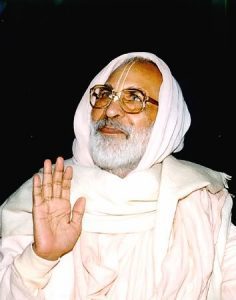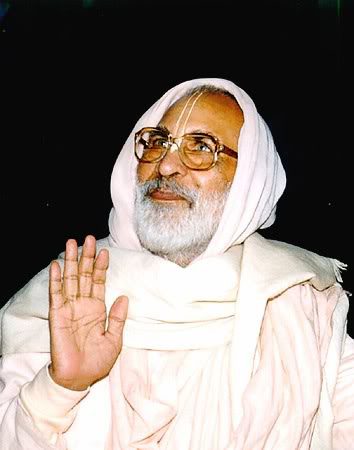Disappearance Day of Srila Bhaktivedanta Narayana Gosvami Maharaja
 Tridandisvami Sri Srimad Bhaktivedanta Narayana Gosvami Maharaja
Tridandisvami Sri Srimad Bhaktivedanta Narayana Gosvami Maharaja
This year, Dec. 22, 2016, is the disappearance day of our beloved Srila Gurudeva, Srila Bhaktivedanta Narayana Gosvami Maharaja. What a compassionate acarya he is. He trained us in the mood of separation from the Lord by first having it for Gurdueva. In the excerpts from the following 7th verse from Vilap-kusumanjali (spoken in 1991 in Vrndavana/Mathura) he shares with us the secrets of that topic: (Listen)]
Text Seven
aty-utkatena nitaram virahanalena
dandahyamana-hrdaya kila kapi dasi
ha svamini ksanam iha pranayena gadham
akrandhanena vidhura vilapami padyaih
Translation
O Svamini, my mistress, Radhe! The heart of this maidservant constantly burns in a great fire of separation from You. Being thus afflicted and crying out with great love, I lament in the following verses.
Commentary
The purpose of reading and uttering the prayers of Srila Raghunatha dasa Gosvami is to develop some samskara, impressions, on the heart. My Guru Maharaja, Sri Srimad Bhakti Prajnana Kesava Gosvami Maharaja, told us to only sing the songs composed by Srila Bhaktivinoda Thakura, Srila Narottama dasa Thakura, Srila Premananda dasa Thakura, Sri Govinda dasa, and other siddha-mahapurusas – perfected, great personalities in our guru-parampara. If we sing the kirtanas of such devotees who are empowered and advanced in bhakti, something of their bhava will certainly enter our hearts.
Guru Maharaja told us a story about Sripad Narahari Prabhu, a disciple of Srila Bhaktisiddhanta Sarasvati Thakura. Narahari Prabhu was not very learned, but he was a very sincere devotee and such a good servant of Srila Prabhupada that all the sannyasis and more learned devotees would bow down at his lotus feet. Even my Guru Maharaja and Parama-pujyapada Srila Bhaktivedanta Svami Maharaja paid respects to him. He was always chanting, never sleeping, and he would always perform any seva at any time.
Narahari Prabhu was ‘the mother of Gaudiya Matha.’ He would take the young boys on his lap, give them milk, put them to sleep, and do everything required to look after them. In the night he would take a hurricane lamp to attend the younger boys, and if one of them had passed urine, he would clean their bedding. He would give them medicines and do whatever else was needed, and everyone considered him to be like Florence Nightingale. [Florence Nightingale was a famous nurse who tended wounded soldiers, often checking on them throughout the night with a lamp in hand.] They also addressed him as Narahari Da, meaning dada, or elder brother.
Narahari Prabhu once became so ill and unable to digest anything that he was about to die. Our Guru Maharaja, who was known as Sri Vinoda Brahmacari at that time, took him to East Bengal, near his own ancestral home, to meet a very famous ayurvedic doctor. After examining him, the doctor said, “If you had not reached here today, he may have died within two or three days. Somehow God has sent you to me. First I want to give him one spoonful of ghee daily.”
Guru Maharaja said, “He will die at once if he takes ghee. He cannot digest even water, what to speak of other things.”
“I know that he will not die,” the doctor explained. “His stomach requires ghee. I will give him ghee, knowing that it will pass through him, but some coating will remain in his stomach. I will give him one spoonful each morning and evening. This will be his treatment.” After fifteen days they obtained a good result, and in one month he was cured.
Similarly, in our present condition we have no bhakti at all, and we cannot understand or ‘digest’ the confidential topics discussed by our acaryas. Yet, when we sing their songs, something will certainly come – a coating – and that will do. It will give a good result. It will give samskara, and we will try increasingly to develop greed. We therefore practice uttering our acaryas’ prayers and songs, and always with great honor and care.
* * * * *
Separation from Guru
Although our Gurudeva has also entered his aprakata-lila, we remain in this world in a very pleasant manner. On special days, like his avirbhava (appearance day) and tirobhava (disappearance day), the occasion comes that we may remember him. At that time, however, we are involved in arranging the festival, and there is very little chance to realize our separation from him. A tear may come to our eye while we are speaking something about him; but it may not come. If the festival is very elaborate, there will be no tears. There is so much to manage, such as the abhiseka, guru-puja, and distribution of maha-prasadam to Vaisnavas, and consequently there is no time to remember him and weep. For the most part we hold these festivals for the general people who have no intimate relation with him, but on that day we should do something so that a feeling of separation will come within our own heart. That is called bhajana.
Special persons, who have realized their immense obligation and indebtedness to Gurudeva for all they have received from him, and who have rendered abundant service to him with visrambha-bhava, a mood of intimacy, will feel separation. They will weep. Such devotees will not consider, “I am so low and my Gurudeva is in such a high stage.” Awe and reverence will not preside; otherwise one cannot weep.
Sastra enjoins, visrambhena guroh seva – the sevaka should perform such intimate service to Gurudeva that Gurudeva is always pleased with him. The guru will not consider even for a moment that, “He is my servant and disciple.” Instead he will feel, “He is my near and dear. He is my heart.” Sri Isvara Puripada, the disciple of Srila Madhavendra Puri, and Govinda, the disciple of Sri Isvara Puri, were servants of this caliber. Although such a relationship with Sri guru is very rare, it is absolutely necessary for raganuga-bhakti. Without a relationship like this, we cannot weep like Srila Raghunatha dasa Gosvami.
When we consider how merciful Gurudeva was and how much greater he is than ourselves, we feel a certain type of sentiment. However, when we remember how near and dear he was and how much he loved us, then we will weep profusely for him.
Yasoda Ma can weep more than Nanda Baba, but the gopis can weep even more than YaSoda; their relationship with Krsna is more intimate. We require this kind of keen relationship with Sri Krsna, Srimati Radhika, and also with our Gurudeva, Sri Rupa-manjari, Srila Rupa Gosvami, and all others like them. Then we can weep for their mercy.
If we have yet to develop an intimate service relationship with our Gurudeva, then surely we cannot imagine our relationship with Sri Rupa-manjari or Srimati Radhika and Krsna. Our entire advancement depends upon on how intensely we serve our Gurudeva; all other relationships and experiences develop on that platform. If we can weep for Gurudeva, we can weep for Srimati Radhika. If we cannot weep for our Gurudeva, we cannot weep for Her. That is my experience. Whatever we know, we know from Gurudeva, and therefore we must weep in our hearts for him.
In the first verse of Vilapa-kusumanjali, Raghunatha dasa Gosvami prayed to Sri Rupa-manjari.
tvam rupa-manjari sakhi prathita pure ‘smin
pumsah parasya vadanam na hi pasyasiti
bimbadhare ksatam anagata-bhartrkaya
yat te vyadhayi kim u tac chuka-puìgavena
My dear friend Rupa-manjari, you are well known in Vraja for your chastity, and you don’t even look at the faces of other men. It is therefore surprising that although your husband is not at home, your lips, which are as beautiful as red bimba fruits, have been bitten. Has this perhaps been done by the best of parrots?
Was Raghunatha dasa Gosvami weeping or laughing? It may seem that he wrote this verse in a laughing, pleasant mood, but actually, while remembering a previous pastime, he was weeping for the lotus feet of Sri Rupa-manjari. “You were so merciful to me. I remember seeing your mood after Krsna kissed you and left a mark on your lips. When will I see you in that condition again?” In the second verse, beginning, “Sthala-kamalini yuktam garvita,” he again offered pranama and wept, “Will I see this again?” These first two verses are very important.
Now, in this seventh verse he cries, “Ha svamini ksanam iha pranayena gadham – if even for a moment I can realize this, I will weep constantly.”
How should we weep? Sri Caitanya Mahaprabhu has expressed this in the sixth verse of Sri Siksastakam:
nayanam galad-asru-dharaya, vadanam gadgada-ruddhaya gira
pulakair nicitam vapuh kada, tava nama-grahane bhavisyati
O Prabhu! When will my eyes be filled with a stream of tears? When will my voice choke up? And when will the hairs of my body stand erect in ecstasy as I chant Your holy names?
Although kim, meaning ‘when?,’ is not present in this verse, we should have this mood: “When will I feel so much lamentation that I will weep while chanting the names Hare Krsna, Radha-Govinda, or Vrndavanesvari?” Weeping is our dharma, the essence of our religious principles.
Srila Raghunatha dasa Gosvami says, “Aty-utkatena nitaram virahanalena – my heart is burning in the great fire of separation.” He sincerely feels this sentiment; and by his grace, and also by the grace of our Gurudeva and guru-parampara, we will also realize something of this one day. This is our real prayer. When we pray and sing that sixth verse of Sri SiksasTakam, this will be our mood: “Tava nama-grahane kim bhavisyati – when, by hearing, chanting harinama, and remembering, will I weep for You?” Those who are very fortunate can lament, weep, and realize the heart of this author.

